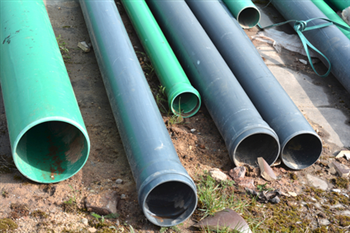
While they are both geothermal pipes with several similarities, polyvinyl chloride (PVC) pipe and high density polyethylene (HDPE) also have many differences. They are considered to be the two most popular types of piping used in underground construction. The following examines what makes these geothermal supplies distinct from one another, as well as compares the two products to one another.
Often used in construction projects, PVC pipe is a durable and cost efficient vinyl polymer. As a lightweight, yet very strong option, they are frequently used for aboveground and below ground piping applications. PVC pipes are an ideal option for use in trenchless situations, as well as for direct burial settings because of its strength. Additionally, PVC pipe is amorphous, lacking a clearly defined form or shape.
HDPE pipes are manufactured using petroleum and are stronger and harder than PVC pipes. This type of piping is semi-crystalline and tends to be more expensive than PVC pipes. In addition, HDPE pipes have the ability to withstand higher temperatures, offer better joint pressure resistance, and are more abrasive than PVC pipes. They have the ability to dampen and absorb shock waves, which minimizes any surges felt by the system they are being used in. As a result, they are often the first choice for underground piping.
The primary difference between PVC and HDPE pipes lies in their strength and pressure capacity for design stress. HDPE pipe walls must be at least 2.5 times thicker than PVC pipes to achieve an equal pressure rating. While PVC is stronger and denser (heavier), HDPE is firmer, more abrasive, more resistant to wear and tear, and has a higher resistance to heat.
In addition, the amount of surge pressure in HDPE pipes tends to be much lower than that in PVC pipes. In most instances, a lower surge pressure results in a longer lifespan for pumping and valves.
PVC pipes are typically chosen for trench less installations and direct burials, while HDPE pipes are usually the top choice for any lower pressure installations.
Both have their advantages and disadvantages, yet they both appeal to project managers and contractors due to their extensive ability to be used in a variety of applications.
PVC Plus offers a wide array of the highest quality well drilling supplies and monitoring supplies, such as HDPE water pressure pipes that can be used in situations where digging is essentially impossible, as well as ground sampling supplies and drill muds. They employ a knowledgeable staff that is always available to answer your questions and offer the assistance you need to choose the best geothermal supplies for your project.